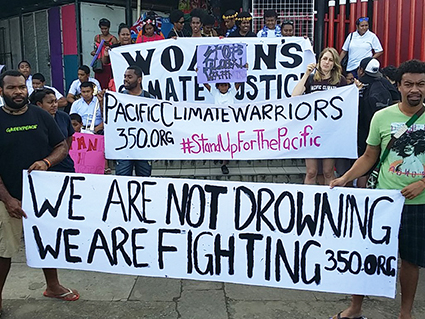
Makereta Komai, PACNEWS Editor
PARIS (Pacnews/SPREP/Pacific): The three major oil and gas economies - Russia, Saudi Arabia and Venezuela - have emerged as main stumbling block to the push by Pacific and Small Island Developing States to limit global temperature to 1.5 degrees Celsius at the climate negotiations in Paris.
Climate Action Network, an association of more than 100 powerful civil society groups around the world that follow the negotiations, said the three countries refused to shift their positions, citing their own vulnerabilities.
“As you can understand the economies of Russia, Venezuela and Saudi Arabia are dependent on fossils. Clearly what the small islands are asking for – to phase out oil and gas will affect their economies big time," said Martin Kaiser of Greenpeace.
Saudi Arabia argued that, like the small islands, it is also faced with extreme weather events like flooding, heat waves and drought.
“The small and vulnerable nations have stood their ground of 1.5 degrees in the negotiations despite the attacks by Russia, Saudi Arabia and Venezuela," said Kaiser.
The 1.5 degree Celsius global temperature limit has been a key demand of the small island developing states through the Alliance of Small Island States (AOSIS) since 2009.
Small Island Developing States from the Pacific, Caribbean and Indian Ocean have consistently pushed this position for six years at every global climate talks.
'Not negotiable'
For two weeks in Paris, Pacific leaders expressed with utmost urgency that 1.5 degrees was "not negotiable" and a matter of survival for the small low lying nations of Kiribati, Marshall Islands and Tuvalu.
Their rally call was supported by a global campaign of "1.5 to stay alive" by climate activists.
At the Paris talks, 106 of the 195 Parties to the United Nations Framework Convention on Climate Change (UNFCCCC) endorsed limiting global temperature rise to 1.5 degrees.
Support has also come from the Coalition of High Ambition Nations, led by Marshall Islands.
Tony de Brum said the group’s 100 nations maintain its goal of high ambitions from all parties.
“We heard calls for deletion of long term goals, concrete language of revisiting the five year review targets and the refusal to recognise the science. We make this clarion call to the world that we will not accept these revisions and deletions and we are not here to accept a minimalist Paris Agreement. This is our red line.
“We have fought many battles in our lives relating to the survival of our people and for justice but this one is special. Both developed and developing nations will not go home with an agreement that doesn’t have the ambition that we have all come to fight for," said de Brum.
Climate Action Network’s Liz Gallanger said what had also emerged from the closed negotiations was the large number of progressive developing countries that were coming forward with compromises compared to Copenhagen in 2009.
“We saw Mexico, Brazil, Nigeria, Colombia, Gambia, Palau, Marshall Islands, Grenada and South Africa come out and defend core elements of the agreement that will get us to a strong outcome here in Paris.
“These countries are showing leadership and we need to see this kind of diplomacy," said Gallanger.
However, the same cannot be said for the European Union and the Umbrella Group which includes Australia Canada, Japan, New Zealand and the United States for "playing it tough" on finance.
“Japan, US, EU, NZ have opposed the legal rigour of the finance language. For India it is about weakening the legal rigour around the ambition mechanism, this five year cycle and ratchet up. These countries are not echoing the spirit of their leaders," said Gallanger.
#4PacIslands
This work is licensed under a Creative Commons Attribution-NonCommercial 3.0 New Zealand Licence.




